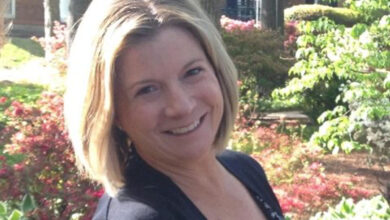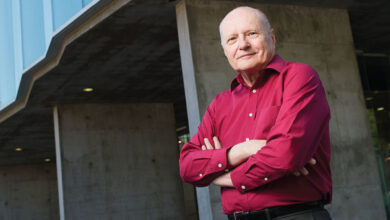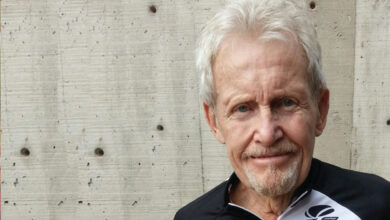
Karl Eller
By April Bourie
‘Consummate Team Player & Tremendous Leader’
“Integrity Is All You’ve Got” is the title of the book Karl Eller wrote about his life as a businessman. Eller, who passed away March 10, is remembered as a man with integrity – and so much more.
“Karl was a great partner and team player,” said UA President Robert Robbins. “There was no ‘I’ in Karl Eller. He was the ultimate consummate team player and a tremendous leader – and people followed him.”
Eller’s love affair with the University of Arizona began at the age of 9 when he moved with his mother and older sister to a house across from Arizona Stadium. After serving in the Army, he attended the UA, majoring in business and playing on the football team. On campus he met his wife, Stevie, and made lifelong friends.
His time at the university made a big impression on him. “Karl saw the U of A as his portal to the world,” said John-Paul “JP” Roczniak, president and CEO of the UA Foundation. “It was the place that gave him the opportunity to achieve success – and he never forgot that.” Eller graduated in 1952.
In 1961, Eller was living in Chicago and working for an advertising agency when he got a call from a former boss at a national billboard company. He offered to sell Eller a portion of the company’s business for $5 million – which Eller didn’t have and which was due in 90 days. He called every friend, relative and business contact he had to find investors.
After getting the funds he needed, he moved his family to Phoenix and opened Eller Outdoor Advertising. Adding television and radio stations to the company, he changed its name to Combined Media before selling it to Gannett in 1979.
“When Karl had the chance to start the business, he had a hard time writing a business plan,” said Roczniak. “He decided, when he had a chance to do something, he would start an entrepreneurship program, so students would know what to do when they start their own businesses.”
Eller then took the position as CEO of Circle K and grew the company to nearly five times the number of stores as when he started. This growth could not be sustained, however, and Circle K filed for bankruptcy protection in 1990. Eller was nearly bankrupt himself, but instead of filing for bankruptcy, he contacted each entity he was indebted to and negotiated more time to pay. “He kept honest on his gift commitment even during his downturn at Circle K,” said Roczniak. “That was inspiring to others.”
Two years after leaving Circle K, he was able to find enough investors for a new venture – Eller Media – which became the largest outdoor billboard business in the nation. He sold it to Clear Channel Communications in 1997 for $1.15 billion.
His professional life included many highs and lows, but he always remembered the UA. He and Stevie donated millions of dollars to university programs, and his dream of starting an entrepreneurship program came to fruition in 1984 when he was able to fund the McGuire Center for Entrepreneurship.
The business school changed its name to the Eller College of Management, but that wasn’t the point, according to Roczniak. “It wasn’t about having his name on anything. He was always about the students and making sure that every kid had the same opportunities he had.”
He also gave of his time to the college and was able to get other business professionals involved. “He was a key to getting successful business people from all over the country to interact with students,” said former president and CEO of the UA Foundation Richard “Dick” Imwalle.
“If a university can get the trifecta in a donor – time, treasure and talent – that’s the best,” said Robbins. “With most people, that would be 1+1+1 = 3. However, with Karl it was 1+1+1 = 6. It was amplified because of the sheer man that he was due to the intangibles of his character, his personality and his incredible loyalty.”
Among his many awards and honors, Eller was named a Father of the Year by the Father’s Day Council Tucson in 2001.
Roczniak added, “What made Karl special was that he always made people around him better. Everything he did at the UA was always about making students, professors and programs better. The U of A without Karl and Karl without the U of A is hard to imagine.”





